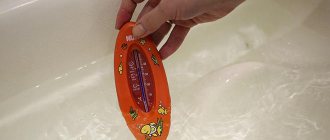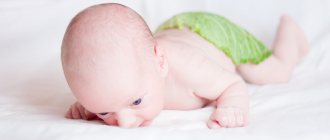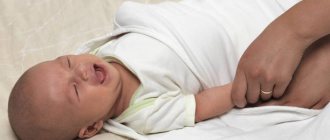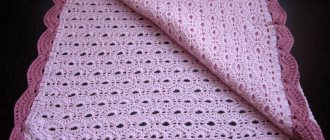Should I change my newborn's diaper at night? Changing a diaper while sleeping is not always necessary. If the diaper is not full, the hygiene procedure can be postponed.
Quite often, parents are faced with the problem when young children have a disruption in their sleep and wakefulness patterns. They confuse day with night. As a result, the child can sleep peacefully during daylight hours and entertain his mom and dad at night. And one can understand the parents’ fear of once again disturbing their child who has fallen asleep at night. What to do if there is something wrong with the diaper? Should I wake my newborn to change his diaper at night? Let's figure it out.
Should I change my newborn's diaper at night?
In order to accurately answer this question, you must first understand why it is necessary to change your child’s diaper so often. And there is only one answer - in order to avoid diaper dermatitis , which causes discomfort to children and is direct evidence that either parents do not carry out all the necessary hygiene procedures, or the selected diaper does not cope with its task.
How many diapers does a newborn baby need per day?
That is why parents should regularly (every 1-2 hours) check the fullness of the diaper, and if the inner surface is wet, then immediately replace it.
Optimal use of an adult diaper
- in the postoperative period, requiring adherence to “bed rest”;
- patients with serious injuries who are forced to lie down for a long time;
- poisoning and intoxication of the body;
- senile enuresis (urinary incontinence).
There is no exhaustive list of diseases that may require the use of diapers. Any illness that confines a person to bed is a reason for the regular use of personal hygiene products.
The best solution to problems for a bedridden patient in such situations is the use of a diaper. Especially if there is no person nearby with a medical education who can provide qualified assistance to the patient.
Special hygiene underwear differs in size, volume, fixation mechanism, level of absorbency, comfort and manufacturer. It is necessary to take a serious approach to choosing a diaper, paying special attention to its functionality and properties.
The composition of the material is of primary importance. In order not to create favorable conditions for the occurrence of inflammatory processes, the diaper should be made of breathable fabric with an outer protective layer designed to accumulate moisture.
The hygiene product should not make any sounds or rustles when moving. For energetic patients, it is extremely necessary to have fastening fasteners on diapers. This option does not restrict physical activity and provides lasting protection against leakage. Moreover, such a system can significantly facilitate patient care. The presence of a special absorbent indicator strip helps to change the diaper in a timely manner.
Which diaper can withstand the night?
Pampers and Huggies have special night lines of diapers: Huggies DryNites and Huggies Elite Soft overnight panties ; Lovular Night panty diapers remain popular.
The advantage of overnight diapers and panty diapers is the increased volume of subabsorbent in the middle layer of the diaper. However, 90% of diapers on the market cope with the absorption of excessive amounts of moisture.
Pay attention to Huggies Elite Soft, Pampers Premium Care, Merries, Moony.
The best overnight diapers
Basic rules for changing diapers for adults
The procedure for changing diapers must be carried out at room temperature. It is extremely important to prevent drafts in the room.
Diapers should be replaced in the following cases:
- After carrying out a regular hygienic process: washing, drying, treating all natural folds of the skin.
- Urge to defecate or complete bowel movement. The presence of waste products in diapers for a long time is unacceptable.
- With frequent and uncontrolled urination, the diaper should be changed every 3-4 hours.
- In case of serious diseases and complications associated with blood formation in the genitals and the presence of bedsores, the diaper should be changed every two hours.
Changing a diaper for an adult should follow the following algorithm:
- Prepare a change of clothing and a clean sheet or diaper.
- Gradually and carefully remove the old diaper, being careful not to stain the patient's skin or underwear. In order to remove the used diaper, you need to unfasten the fasteners and carefully turn the person on his side.
- Place a protective diaper under the patient's back.
- Thoroughly rinse the skin, groin area, and buttocks to remove natural secretions. Using light massage movements, treat the necessary areas with a protective, moisturizing cream or ointment to prevent bedsores. If the patient shows signs of inflammation, diaper rash or irritation, use powders to restore the normal balance of the skin. If soft tissue changes, treat bedsores with an antiseptic and apply a sterile bandage.
- Remove the diaper from the package by removing the sticker and protective layer. Smooth out any wrinkles, roll or crease the diaper for a better fit. The absorbent layer should be activated and the side edges should be in a vertical position.
- Turn the patient to his side, slightly bending his legs at the knee joint to partially guide the edge of the product under the body of the person lying down. Place the hygiene product under your back so that the fasteners are located on the side of the head, and the filling indicator is along the center line of the spine.
- Turn the patient onto his back, bending his legs slightly and completely straightening the special underwear. During this manipulation, the patient should not experience a feeling of discomfort.
- Pull the outer part of the diaper between your legs and secure it, covering the groin area. Fasten all adhesive fasteners: attach the lower ones in stages, tightly encircling the legs and fixing the rivets across the patient's body, from bottom to top. Next, fasten the fasteners in the direction across the patient’s body.
It is important to remember that if the algorithm of actions is incorrect when putting on a diaper, there is a high risk of microtrauma, abrasions and irritation on the patient’s skin. Subsequently, this can lead to infection and inflammatory processes in the perineum.
Diapers should be changed regularly: in the morning and lunchtime, before bed, and as needed. When changing a diaper, you need to monitor the readings of a special indicator strip, which changes its color depending on the degree of water saturation of the product. After bowel movements, the patient is recommended to undergo “air baths”, which should take two hours daily. Bed linen should be changed every day.
Diapers for bedridden patients are an indispensable means of intimate hygiene. They help make life easier for people with disabilities, making it as comfortable as possible. Diapers for adults protect the patient's skin, thereby preventing the development of severe inflammatory diseases.
Should I wake my newborn to change his diaper at night?
In the first six months of life, children eat as actively at night as during the day, especially if you are breastfeeding (with artificial feeding, starting from 3 months, parents stick to the schedule more). And therefore, the diaper can also be actively filled, as during the waking period.
But here everything is very individual:
- Some babies sleep so soundly that they do not pee for 4 hours at all, leaving the diaper dry, but in the morning they fill it to the maximum;
- Some of the babies eat every three hours, and therefore the sleep is not so deep and sound, and therefore peeing occurs steadily “a little bit” all night long;
- On the contrary, some babies fall asleep soundly in the morning, and their main “filling” time falls precisely in the first half of the night.
Whatever type your baby is, follow these guidelines to ensure dryness and comfort::
- Check the degree of filling and the absence of feces 3-4 times a night. This must be done without interrupting the baby’s sleep, so consider the shape of your nightwear so that there is free access to his butt;
- If the diaper is dry, sleep peacefully until the next check, but listen to your sleep - if the baby grunts, spins, sleeps restlessly, he may have pooped. Not all babies wake up after a bowel movement;
- If, after checking, an overfilled diaper is revealed, replace it carefully, being careful not to wake the child. Well, if feces are detected, of course, you will have to transfer the baby to the changing table and carefully remove everything using wet wipes or wash the butt under warm water.
For nighttime sleep, it is better to purchase premium diapers - they have soft elastic bands, strong fasteners, absorb moisture faster and better and can last up to 10-12 hours, depending on the manufacturer.
Do I need to change a diaper at night if it is not full enough?
Not all babies pee a lot while sleeping. Therefore, pediatricians do not recommend waking up a baby at night if he sleeps peacefully and the inner surface of the diaper is dry.
If the diaper does not leak, the skin is dry and there are no odorous “surprises” inside, you should not touch it until the child wakes up.
If the baby is fast asleep, but the diaper is wet and full, then parents will have to change the diaper in their sleep to avoid skin irritation and diaper rash .
Most mothers share the opinion of doctors. For example, Yulia (26 years old) says: “For the first months of my son’s life, I changed diapers even at night, because they quickly filled up and the baby tossed and turned and cried. But by the time I was four months old, I stopped doing this, because Artemchik sleeps well, doesn’t cry, and the diaper is only filled in the morning.”
If you understand the logic of the mother’s actions, we can say that she acts exactly according to the instructions of the children’s doctors, because if her son does not have diaper rash, he sleeps well and nothing bothers him, then there is no need to disturb him in his sleep. But if you notice that the child pooped in his sleep, then you will have to act differently.
In cases where a child craps himself in his sleep, parents should not only change the diaper, but also thoroughly wash the baby with warm water (34-36 °C). It is recommended to use baby soap if it was not used during night bathing.
To simplify the nightly replacement process or eliminate it altogether, we recommend the following::
- For sleep, choose clothing that allows easy access to the diaper. Bodysuits or pants with buttons between the legs work well. They are easy enough to remove without disturbing your sleep.
- Instead of a bodysuit, you can use a cocoon diaper. This option is the most ideal for newborns. Due to the fact that the zipper opens both at the top and bottom, getting to the diaper will be very easy.
- Wear special night diapers. They have a thicker absorbent layer and, if the child does not lose weight at night, you will not have to change them until the morning.
Do I need to change a diaper if it is not full enough?
Not all babies pee a lot while sleeping. Therefore, pediatricians do not recommend waking up the baby at night if he sleeps peacefully and the inner surface of the diaper is dry.
How to teach a child to sleep without a diaper at night?
If the baby is fast asleep, but the diaper is wet and full, then parents will have to change the diaper in their sleep to avoid skin irritation and diaper rash.
Most mothers share the opinion of doctors. For example, Olya (25 years old) says: “For the first months of my son’s life, I changed diapers even at night, because they quickly filled up and the baby tossed and turned and cried. But by the time I was four months old, I stopped doing this, because Artemchik sleeps well, doesn’t cry, and the diaper is only filled in the morning.”
If you understand the logic of the mother’s actions, we can say that she acts exactly according to the instructions of the children’s doctors, because if her son does not have diaper rash, he sleeps well and nothing bothers him, then there is no need to disturb him in his sleep. But if you notice that the child pooped in his sleep, then you will have to act differently.
In cases where a child craps himself in his sleep, parents should not only change the diaper, but also thoroughly wash the baby with warm water (34-36 °C). It is recommended to use baby soap if it was not used during night bathing.
How to change a baby's diaper in a dream?
Many mothers think about how to carefully change a diaper at night if they find that their baby’s diaper is full and needs to be changed urgently. In fact, the procedure is absolutely the same as during the day, that is:
- Turn on the night light so as not to disturb the baby with bright lighting.
- Prepare in advance .
- Try to do everything in complete silence . Children respond very well to their mother's voice.
- The baby is placed on a changing table with a disposable diaper .
- A dirty diaper can be unfastened, but there is no need to rush to remove it, because the dry front part can remove feces from the skin .
- Next, you should take the baby by the ankles and lift his butt off the table - this will allow you to quickly remove the dirty diaper .
- If the contamination is small, then you can postpone water procedures until the morning, wiping the baby with baby wipes. If the child is very dirty, then he needs to be washed .
- After the bath, the baby's skin should be carefully wiped, use powder and diaper rash cream .
- Putting on a clean diaper - place a clean diaper under the child, lifting him by the legs, then the hygiene product is straightened between the legs and fastened
- After this, the baby can be sent back to the crib. If he managed to roam around during this time, then it is better to feed him .
- As for a dirty diaper, you can roll it tightly, secure it with tape and place it in a disposable bag - then until the morning no unpleasant odor will disturb the night's sleep of the child and his parents. You can also use a diaper disposer - this device is equipped with a special sealed film, so the smell will not penetrate outside.
Adhesive tape on panty diapers
Very often you can hear the phrase: “I slept like a baby,” which indicates that a person slept in a deep and peaceful sleep and woke up happy and joyful. Every parent wants his child’s sleep to be exactly like this. Therefore, you need to carefully monitor the baby’s behavior at night and change diapers as needed .
Newborn's sleep. Advice from Pampers expert Tatyana Butskaya
Advice from Pampers expert Tatyana Butskaya. Photo: Courtesy of Pampers
It would seem that, so small and defenseless, they are stronger than us adults. And in order to adapt to extrauterine life, newborns constantly SLEEP!
Sleep in the first months of a child's life is necessary, like air, like breast milk. In the first 10-14 days, children are practically not sensitive to external stimuli; they are protected by sleep. If the baby does not sleep well, he will lag behind in development. The brain grows while you sleep!
However, how much should a newborn sleep? You can often find information about 16–20 hours of sleep. But this is the “average temperature in the hospital”, because the range of normal values here is quite wide – from 14 to 22 hours! If a child maintains a certain interval of sleep and wakefulness, eats well, gains weight, falls asleep without crying, then his biological clock is set to exactly this schedule. For information, I will say that according to science, a newborn needs short 40-50 minute periods of activity. During this time, the child should wake up, eat, change clothes and fall asleep again. Not life, but a fairy tale. Like any fairy tale, it ends someday. And this happens around 3-4 weeks of life.
If parents do not teach their child in the first month that there are the concepts of “day” and “night,” then later they will have to put a lot of effort into this, including sacrificing their sleepless nights. Important information: the most beneficial sleep for a person of any age from 0 to 99 years old occurs before 12 at night (more precisely from 19.00 to 01.00) - everyone knows this, but everyone also ignores it. It seems to us that we will catch up later. We won't catch up. The structure of sleep in the morning is completely different; it does not contribute to the development of the brain in a newborn and the full recovery of his parents.
I am often asked, “How can a newborn be taught to sleep at night if he wakes up every 2-3-4 hours to eat?” This is the right question, because a child has two main dominants: sleep and food. The stomach is small, less than 100 ml of food fits in it, which means it asks to eat often. We accept these laws of nature without intending to change them. We adapt to them.
Advice from Pampers expert Tatyana Butskaya. Photo: Courtesy of Pampers
From the very first weeks of a newborn's life, his parents must live in a day/night rhythm. During the day the apartment is bright and sunny, the curtains are open and the lamps are on. No one speaks in a whisper or walks on tiptoes. This doesn't mean you need to turn on your favorite radio station at full volume. Extremes are not our friends. Just like development methods that are not age appropriate. An abundance of emotional impressions during the day and especially in the evening can lead to crying at night - this is a reaction to excessive nervous tension. Pay more attention to tactile and verbal communication with your newborn. Hug him, kiss him, stroke him, talk to him, sing lullabies. But it is better to leave the lesson on the early development system with CDs until the moment when the child’s eyes begin to look at the world like an adult. This will happen closer to one month of age. Although it is still very, very early to accustom a child to a TV screen and a tablet every month.
Next, learn to recognize a baby’s REM and NREM sleep. This is not a theory, but a real practice, I’ll tell you why below. So, during REM sleep, children's pupils actively move, they move their arms and legs, grimace, make sucking movements with their mouths, and make various sounds. During this phase, sometimes the newborn may begin to cry in his sleep. If at this moment you grab the child in your arms and begin to calm him down, the result will be the opposite of what was expected - the baby will wake up. Remember, it is better not to disturb the child during REM sleep. He will sob a couple of times and then fall asleep.
Children may also wake up when transitioning from one sleep cycle to another. Such momentary awakenings are needed to control the situation - “Is everything okay? Are your parents nearby? Am I wet? Don't I want to eat? And if the parents rocked the child in their arms and then put him to sleep in the crib, then after 20-40 minutes the child can wake up, scan the situation and turn on the panic button. A second later, the parents will hear loud crying. If the situation repeats - rocking in the arms, and sleeping in a crib, then after a certain short time the child will wake up again. The conclusion is this: if you don’t want to become hostage to a “tame child” with neurological symptoms caused by frequent microconcussions of the brain, teach your baby to fall asleep in the crib. Sit next to him, hug him, sing a song, but don’t pick him up. Within a couple of weeks, the child will understand that the crib is the norm and will stop perceiving it as an aggressor.
What to do with little hands that live their own lives in newborns and prevent them from falling asleep or wake them up with careless movements? First, you need to understand that this is not a pathology or a feature of your child, but just an innate Moro reflex. Secondly, you need to swaddle. Even if it’s loose, even if it’s just hands, it’s better to fix them and let the baby fall asleep than to fight for the freedom and independence of a child who’s always sleep-deprived.
Pampers. Photo: Courtesy of Pampers
Advice for young parents:
1. Half an hour before bedtime, dim the lights in all the apartments and turn off the sound on the TVs. NIGHT must fall in the apartment. A night light can be turned on in a children's room, no more.
2. If dad comes home from work five minutes before the newborn’s bedtime, then this is not a reason for fun games. Dad's happy face is already an irritant for the child's nervous system. There are two ways out - either dad tries to come an hour earlier, or kisses the already sleeping baby. There is also the option of communication between the newborn and the father at night, but this option is rarely used, because men need to get enough sleep before the working day. Actually, nursing mothers also need to get enough sleep, and this is what the next point is about.
3. A calm mother is one who sleeps enough. Even with night feedings, you can get enough sleep if you live at the rhythm of a newborn. He fell asleep - you fell asleep, he woke up - you woke up. Usually 3-4 such intervals are enough for mom to feel good.
4. When a child wakes up at night, he needs not only to be fed, but also to have his diaper changed. Proper diapers that do not leak, do not irritate the skin, do not cause prickly heat and allergies - this is the key to a child’s healthy sleep. Pampers diapers for newborns are soft as silk, gentle as a mother's kiss, and will keep your baby sleeping. If a child pees, the liquid is distributed over the entire surface of the diaper; if he poops, the liquid fraction is immediately absorbed and does not irritate the skin. For children in the first days of life, there are diapers with a slit for the navel, irritation of which can disturb the baby's sleep.
5. When you feed your baby and change a diaper at night, do not turn on the light or go into another room. Don't talk loudly or play with your child. The processes of feeding and changing clothes should take place in darkness and silence.
6. Newborns should sleep on their back or side. There are special positioners that help keep the baby in the correct position. Parents often say “my child, just like me, likes to sleep on his stomach.” This is dangerous. The baby can bury his nose in the mattress.
7. Children under 1 year old should sleep without a pillow.
8. Do not use duvets for newborns. The child may turn around unsuccessfully and end up under the blanket. If you want to cover your child with a blanket, it is better to use a knitted one. Tuck it under the mattress.
9. Avoid overheating the child at night and maintain a temperature in the child’s room that is comfortable for adults, preferably around 20 degrees.
10. Air humidifiers are useful for newborns, because in standard apartments, especially in winter, when the radiators are heated, the humidity is sharply reduced.
And in conclusion, I want to say that problems with sleep in a child can be associated not only with a disruption in the rhythm of the day or physiological discomfort. Allergic diseases accompanied by itching, colic, which torment children from birth to 3 months, gastric reflux, iron deficiency anemia, rickets, malformations of the respiratory system - such diagnoses are made by the pediatrician and they are also treated. Any self-medication, especially on the Internet, is harmful and quackery.
How often should I change
Doctors believe that diapers should be changed when they are full. However, the number of bowel movements varies at different ages in a child. If in the first months the baby relieves himself up to 25 times a day, but in small quantities, and one diaper is enough for an average of 4 hours, then with age the amount of urine increases and the frequency of urination decreases. Therefore, parents should focus on analyzing the volume of fluid secreted by the baby, among other things.
In the first few months of a newborn's life, it is recommended to change disposable diapers every 2-3 hours. This will help reduce the risk of developing diaper rash, redness and diaper rash.
During the daytime
- change after each act of defecation, regardless of the last time it was changed;
- Before every trip outside or before going to bed, you should put on a clean diaper, even if it is not yet full enough;
- You need to check the contents of the diaper every half hour.
Frequency of shifts at night
If the baby has defecated at night, the diaper must be changed. It also needs to be replaced when it is completely filled with urine and begins to leak.
If the newborn only pees at night and sleeps peacefully, then he can be left until the morning.
Do I need to change it while walking?
Sometimes children's surprises overtake their parents while walking. If the weather is warm, you can change the diaper in the stroller. If the weather does not allow this, then you need to return home. If the need to change a diaper arose in a clinic or in a shopping center, then this can be done in a special room for mother and child.
Summer or winter: is there a difference?
During the cold season, the maximum continuous time a baby is in a diaper should be no longer than 5 hours. In hot weather, this period is halved.
Gender and age affect the frequency of changes
The frequency of changing a diaper does not depend on the gender of the child. But age affects this:
- in the first 2 months of life, a newborn needs to change it every 2-3 hours;
- from 2 to 6 months can be replaced at intervals of 4-5 hours, while regularly monitoring its filling;
- For a baby older than six months, the diaper is changed in accordance with its individual characteristics (some pee a little, but often, others - a lot, but rarely).
When should you change your baby's diaper?
Evgeny Komarovsky outlined his recommendations in a video.
In it, a famous pediatrician said that it is necessary to change a child’s diapers in 4 cases:
Read also: Mom's breast milk turned blue when her daughter was vaccinated
- If the baby has gone “big” (in most cases this can be easily determined by the smell).
- If the diaper has not been changed for at least 3-4 hours, and now there is a very convenient moment for this.
- If you definitely won't be able to change the diaper in the next couple of hours. For example, before a walk, going to the clinic, or before bed.
- If the baby has a wet bottom under the diaper. Moreover, it doesn’t matter whether it’s wet from urine or sweat. Therefore, in order to prevent the appearance of prickly heat and irritation, it is imperative to change the diaper.
By the way, Huggies diapers for newborns and babies from 3 months are equipped with a special indicator, which changes color as the diaper is filled and signals parents about the need to change the baby's clothes.











